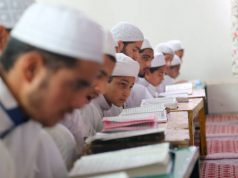The Department of Higher Education in the Telangana State deals with college education, technical education and universities. The main objectives of the department should be the development of Undergraduate and Post graduate education, increasing access to higher education, development of infrastructure in government colleges and ensuring maintenance of high standards of education at all levels.
The core point of higher education is a university system, wherein the undergraduate (UG) and post graduate (PG) courses are offered for the award of degrees. Knowledge in several subjects like arts, humanities, social sciences, law, sciences, technology, engineering etc are imparted through coursework. To fulfill the above task we need a large human resource base but when we observe the real fact of universities we can see that we have serious shortages in this area. Osmania is the one of the oldest universities in Telangana, which is short of 452 associated professors and 280 assistant professors out of the 511 and 601 sanctioned posts respectively. Similarly in Kakatiya University of Warangal, the number of associate professor posts sanctioned is 95 and assistant professors is 242 but 86 and 61 seats respectively are vacant. The condition is more pathetic in Telangana University, where out of 137 total sanctioned posts, 56 are vacant. In Mahatma Gandhi University, 34 out of 70 seats are vacant, 51 out of 63 seats are vacant in Shatavahana university, 87 out of 95 in Palamuru University, 199 out of 409 faculty seats are vacant in JNTUH, 34 out of 63 are vacant PS Telugu University and in RGUKT, all 105 posts are lying vacant (Acc to TSCHE- Statistical data of 2015).
The education administration and academic designations show variations between university and college systems of education. It means less human resource in education dept and uneven distribution of work like, single employee is given a charge of department apart from some responsibility of administration, into departmental works and also works of admin, etc. However the case should be that a faculty should teach students. The number of personnel in Telengana working in the field of education is discouragingly low when compared to all-India data, as periodic recruitment has been absent. It is a well established fact that periodic recruitment maintains quality in teaching-learning process, and the gap in this area has contributed to the deterioration in quality of education.
Out of the 11 state universities in Telangana, three have “A” grade and one has “B” grade as per NAAC grading. If the condition of state universities which are under the control of government is so pathetic, what good we can expect. Providing faculty to students is the basic requirement of any educational institution, and if this is not properly done, you can only imagine the state of infrastructure, sports, laboratories for science departments, hygiene in hostels and other requirements. Without the faculty, who will train the students? Will they get lessons and guidance in canteens and parks of universities?
Higher education starts after the SSC. According to statistics, ( TSCHE- Statistical data of 2015) there are 10936 higher secondary schools in the state with an intake of 4,999,460 students and 2493 junior colleges with an intake of 378973 students. So what about the remaining 120487 students who has passed SSC? The numbers are dropping at every stage, which indirectly shows increased dropout rates. As far as the faculty is concerned, Telangana has 1839 temporary, adhoc, contract and part time teachers. As mentioned above, large number of seats remain vacant at the university level as well.
Even in professional colleges, more number of seats for students are falling vacant every year, showing a decreasing quality of education. In 2015-16, a total of 2,12,821 students appeared for EAMCET exam for engineering, and 1,63,350 qualified. Engineering colleges took in 1,26,468 students. 11,438 students joined for B Pharm in 145 colleges, 41,756 joined for MBA in 347 colleges, 2,966 joined for MCA in 29 colleges, 22,670 joined for B.Ed in 225 colleges and 2,850 opted to study law in 17 colleges. At 1,63,426, Only 1/3rd of the total number of students in the state enroll in professional colleges, while 2,83,823 students choose arts and science degree courses, according to TSCHE data.
There is lack in mismatch of SSC to intermediate and intermediate to UG, there no even distribution of students from one level to another level. (no of intake in SSC and intermediate has very big margin, similarly intermediate to degree. Tenth (SSC) intake in state is 49,99,460 and intermediate intake is 3,78,973 where is 50 lakhs and 4 lakhs ratio).
But the TSCHE board still claims they are doing a good job, standardizing assessment procedures and also calling Telangana the Knowledge corridor of the country. Does the problem lie with the planning and promotion department or the government which, as a democratically elected one, has several responsibilities towards the public.
The enrollment data from the year 2014-15 shows that are 7,55,336 students for various programmes (Ph.D, M.Phil, PG, UG, PG-Diploma, Diploma, Certificate and Integrated), whereas in 2010-11 the number was 12,12,258. The number of students has actually dropped and the government is still going ahead with its claims of “Bangaru Telangana” on the strength of the quality of its higher education. Students are being certified but employment opportunities have not been created even after the CM of Telangana announced it would be. The interests of students and youth are at stake.







[…] S., 2016. Reflections on the state of higher education in Telangana. [Online] Available at: https://thecompanion.in/reflections-on-the-state-of-higher-education-in-telangana/ (Assessed on 24 […]